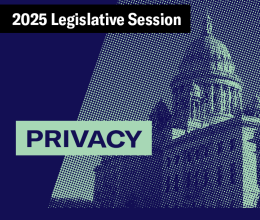Newly obtained documents reveal that Rhode Island state officials are concerned that federal legislation called the Real ID Act will require extensive changes to existing practices at the Registry of Motor Vehicles and will carry expenses of more than $20 million that will have to be absorbed by state taxpayers and license applicants. The Act, passed by Congress last spring without public hearings, imposes federal regulations on the design, issuance and management of state driver’s licenses – turning them, for all practical purposes, into a National ID card. RI ACLU executive director Steven Brown today called the information contained in the documents “one of many compelling reasons for Congress to repeal this ill-conceived law.”
Since the law was enacted, groups across the political spectrum have voiced concerns about the statute’s disturbing impact on privacy and the rights of immigrants. The documents released today indicate that RI DMV officials – the people actually responsible for carrying out the law – also have serious problems with Real ID. The documents were part of a national survey conducted of state motor vehicle officials by the American Association of Motor Vehicle Administrators (AAMVA). A copy of Rhode Island's response to the survey was obtained by the ACLU.
In response to questions about the state’s ability to link its motor vehicle information database with those of other states, as the statute requires, the DMV responded that “simple changes to our computer system require months of programming and are very costly,” and that the “estimated cost to update this antiquated system” to comply with the law “is a minimum of $20 million.” The DMV also said it would “need to hire law enforcement personnel” to comply with other provisions requiring the verification of identity documents, and that “another major concern” is the law’s impact on “already overworked DMV clerks.” In fact, of twenty REAL ID requirements surveyed by AAMVA, the RI DMV responded that ten would have a technological, financial and/or personnel impact on current practices. The national survey responses showed that the concerns expressed by Rhode Island officials are broadly shared by motor vehicle administrators around the country.
The ACLU has objected that the new law will create a national ID system in this country. In addition to that and the costs, the law’s implementation is expected to generate longer lines, repeat visits to the DMV, bureaucratic errors and, for a number of people, the inability to obtain a license, while doing little to prevent terrorism, its stated goal. Since the Act does not take effect until 2008, the ACLU and other groups have begun working to press Congress to repeal the statute.




